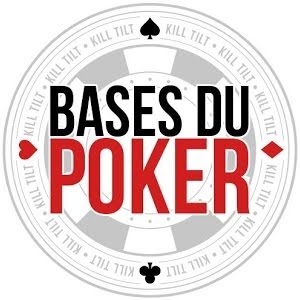Kill Tilt Base Du Poker
Play the best free games, deluxe downloads, puzzle games, word and trivia games, multiplayer card and board games, action and arcade games, poker and casino games, pop culture games and more.
That's how I see this article. It's the most important one of the three, but without the yin, we only have yang.
Insert nickel, push in slide. Flip ball into playing field and try to catch in the catcher by turnning the knob back and forth. If you catch it, move he catcher to the right and deposit the ball in the scoring column. You get five balls. Free poker - free online poker games. 247 Free Poker has free online poker, jacks or better, tens or better, deuces wild, joker poker and many other poker games that you can play online for free or download.
7. Mental instability and unpeacefulness
Tilting at the poker tables can also have a negative impact on your loved ones; anger and emotional disorientation will start flowing into different areas of your life and trust me you do not want them to interfere in your interpersonal interactions.
 and trying to accomplish that using every last resource that you have and feeling the glory every time you outplay someone through every bone of your body, wanting to excel by all means and master the game, being one of the best, you start getting addicted to the swingy aspect of the game.
and trying to accomplish that using every last resource that you have and feeling the glory every time you outplay someone through every bone of your body, wanting to excel by all means and master the game, being one of the best, you start getting addicted to the swingy aspect of the game.Let's say today you lose 50£, tomorrow you lose another hundred but you have a friend who won 1k£ playing spin'n'go's and you think to yourself hey I'm kind of stuck, why not play some spin'n'go's and some omaha because you obviously were unlucky at Hold'em, instead of working on your mistakes and flaws and taking your game to the next level.
Get addicted to learning the game and how to play it perfectly inside out and make the perfect adjustments versus different types of players, and not to getting back the money you lose in the first sessions.I will be very honest and tell you that you will probably lose around 200 to 500 dollars playing those 2$ tables until you will start profiting constantly.
Now enough of the reasons and more of the how to!
Kill Tilt Les Bases Du Poker Pdf
Your goal is to beat those guys, and the truth is no matter how talented you are, others' work will overpower that. I'm not saying go play 100k hands a month, I'm saying study more than they and do this passionately and powerfully, and dedicate your 110% to your dream.
Even if all you see are mountains to climb, once you're on top of one of them, the point of view changes drastically, doesn't it?
1. Pre-session

Kill Tilt Base Du Poker Download
2. In the heat of battle
Kill Tilt Base Du Poker Room
Either way, a 30 minute break is in order right now, and a walk is the best way to do it. Go to the corner shop and get a coffee, go to a neighbor and have a chat. Walk on the streets and call a friend. These are all good ways to spend your well-deserved break.
Now that we have learned the 7 Unknown Factors of Tilt and how we can avoid them to improve our game we should also say that one factor that can improve our game is knowing the Poker Rules.
Tilt originated as a poker term for a state of mental or emotional confusion or frustration in which a player adopts a less than optimal strategy, usually resulting in the player becoming over-aggressive. Tilting is closely associated with another poker term, 'steam'.
Placing an opponent on tilt or dealing with being on tilt oneself is an important aspect of poker. It is a relatively frequent occurrence due to frustration, animosity against other players, or simply bad luck.
One possible origin of the word 'tilt' is as a reference to tilting a pinball machine. The frustration from seeing the ball follow a path towards the gap between the flippers can lead to the player physically tilting the machine in an attempt to guide the ball towards the flippers. However, in doing so, some games will flash the word 'TILT' and freeze the flippers, causing the ball to be lost for certain; as in poker, this suggests that over-aggression due to frustration leads to severely detrimental playing techniques.[1]
While 'tilting' originally applied to poker, it has recently become a common term when talking about other games, especially chess and esports titles. Tilting in esports causes players to 'lose control due to anger'.[2]
Common Causes of Tilt[edit]
The most common cause of tilt is losing, especially being defeated in a particularly public and humiliating fashion. In poker, a bad beat can upset the mental equilibrium essential for optimal poker judgment, causing frustration. Another common cause of tilt is bad manners from other players causing frustration which eventually leads to tilting.
Though not as commonly acknowledged or discussed, it is also quite possible to go on 'winner's tilt' as a result of a positive trigger: such as winning unexpectedly, or going on a string of good luck. Strong positive emotions can be just as dizzying and detrimental to one's play as negative ones. Tilting and winner's tilt can both lead to the same habits.

Advice when tilted[edit]
Kill Tilt Les Bases Du Poker
For the beginning player, the elimination or minimization of tilt is considered an essential improvement that can be made in play (for instance in the strategic advice of Mike Caro). Many advanced players (after logging thousands of table-hours) claim to have outgrown 'tilt' and frustration, although other poker professionals admit it is still a 'leak' in their game.
One commonly suggested way to fight tilt is to disregard the outcomes of pots, particularly those that are statistically uncommon. So-called 'bad beats,' when one puts a lot of chips in the pot with the best hand and still loses, deserve little thought; they are the product of variance, not bad strategy. This mindset calls for the player to understand poker is a game of decisions and correct play in making the right bets over a long period of time.
Kill Tilt Base Du Poker Game
Another method for avoiding tilt is to try lowering one's variance, even if that means winning fewer chips overall. Therefore, one may play passively and fold marginal hands, even though that may mean folding the winning hand. This may also imply that one plays tightly— and looks for advantageous situations.

Once tilt begins, players are well-advised to leave the table and return when emotions have subsided. When away from the table, players are advised to take time to refresh themselves, eat and drink (non-alcoholic) if necessary, and take a break outside in the fresh air.
If none of these work in lessening tilt, players are advised to leave the game and not return to playing until they have shaken off the results that led to the tilt.
The intent of the advice is to prevent the upset person from letting negative emotions lead to bigger losses that can seriously hurt one's bankroll.
Kill Tilt Base Du Poker Player
Tilt must be taken seriously, requiring immediate attention following its presence. The progression in poker for chronically tilted players may be significantly hindered as their judgement becomes progressively impaired as agitation becomes more prominent. Paying close attention to playing statistics can assist in preventing this, as a statistical overview of recent hands can reduce the players likelihood to play impulsive hands habitually.[3]
Tilting others[edit]
The act of putting an opponent on tilt may not pay off in the short run, but if some time is put into practicing it, a player can quickly become an expert at 'tilting' other players (with or without using bad manners). In theory, the long-run payoff of this tactic is a monetarily positive expectation.
Common methods of putting a table on tilt include:
- Playing junk hands that have a lower chance of winning in the hope of either sucking out and delivering a bad beat (which can be an enjoyable occasional style which will make the table's play 'looser') or bluffing the opponent off a better hand (with the option of showing the bluff for maximum tilting effect).
- Victimising individuals at the table, (which is often considered a more old-fashioned tactic, identified with 1970s 'verbal' experts such as Amarillo Slim.)
- Pretending intoxication, i.e. hustling, excellently demonstrated by Paul Newman against Robert Shaw in The Sting (although his technique included cheating).
- Constant chattering, making weird noises and motions whenever you win a hand, or other erratic behavior is a 'tilting' or 'loosening' approach first discussed by Mike Caro.
- Taking an inordinate or otherwise inappropriate amount of time to announce and show your hand (also called 'slow-rolling') at the showdown. (Such deliberate breaches of etiquette have the side effect of slowing play and risking barring, thereby limiting the earnings of the expert player. For this, and other social reasons, such tactics are mostly associated with novices.)
These antics can upset the other players at the table with the intention of getting them to play poorly.
See also[edit]
References[edit]
- ^Gambling with the Myth of the American Dream by Aaron M. Duncan
- ^What to pay attention to in the OpenAI Five Benchmark
- ^'HowToLearnPoker.net: Being on tilt can ruin your poker bankroll'. howtolearnpoker.net. Retrieved 2011-08-24.